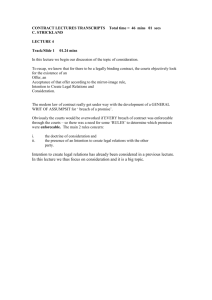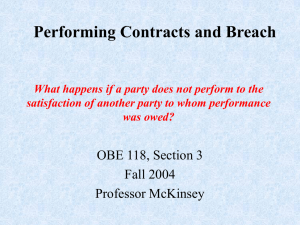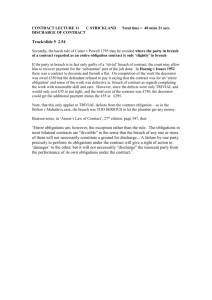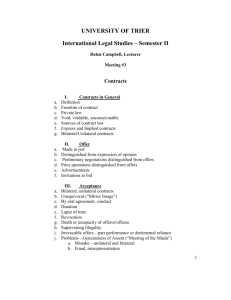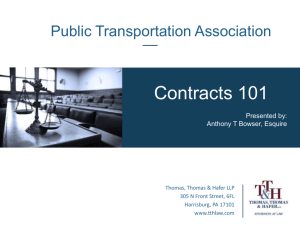discussion questions: contracts i
advertisement
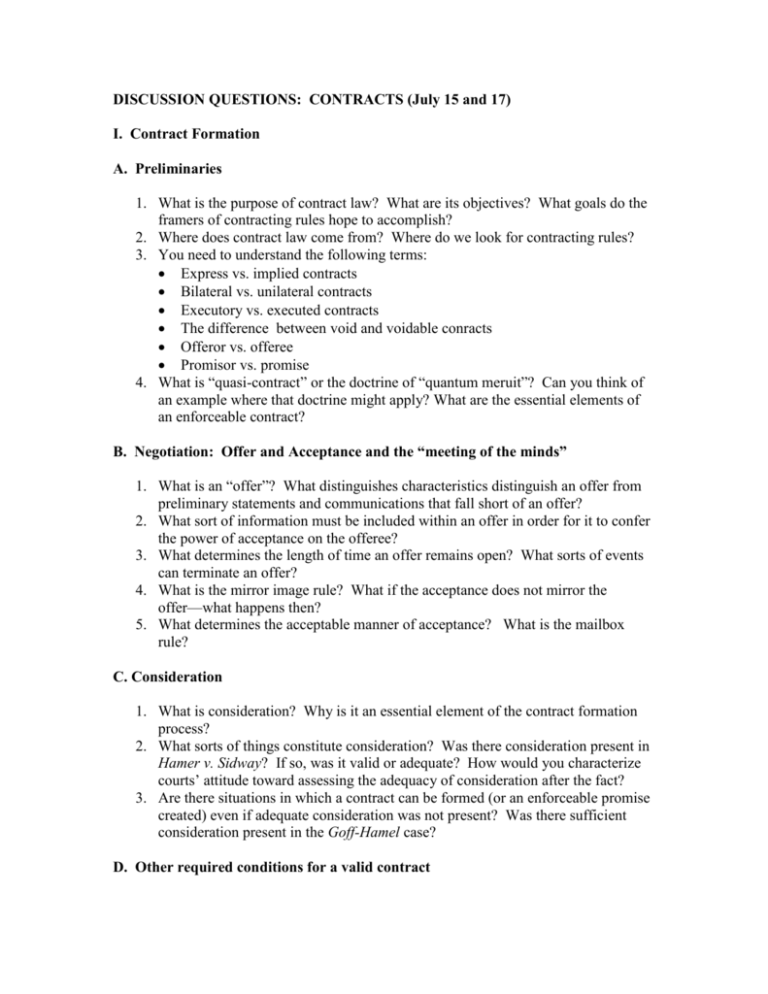
DISCUSSION QUESTIONS: CONTRACTS (July 15 and 17) I. Contract Formation A. Preliminaries 1. What is the purpose of contract law? What are its objectives? What goals do the framers of contracting rules hope to accomplish? 2. Where does contract law come from? Where do we look for contracting rules? 3. You need to understand the following terms: Express vs. implied contracts Bilateral vs. unilateral contracts Executory vs. executed contracts The difference between void and voidable conracts Offeror vs. offeree Promisor vs. promise 4. What is “quasi-contract” or the doctrine of “quantum meruit”? Can you think of an example where that doctrine might apply? What are the essential elements of an enforceable contract? B. Negotiation: Offer and Acceptance and the “meeting of the minds” 1. What is an “offer”? What distinguishes characteristics distinguish an offer from preliminary statements and communications that fall short of an offer? 2. What sort of information must be included within an offer in order for it to confer the power of acceptance on the offeree? 3. What determines the length of time an offer remains open? What sorts of events can terminate an offer? 4. What is the mirror image rule? What if the acceptance does not mirror the offer—what happens then? 5. What determines the acceptable manner of acceptance? What is the mailbox rule? C. Consideration 1. What is consideration? Why is it an essential element of the contract formation process? 2. What sorts of things constitute consideration? Was there consideration present in Hamer v. Sidway? If so, was it valid or adequate? How would you characterize courts’ attitude toward assessing the adequacy of consideration after the fact? 3. Are there situations in which a contract can be formed (or an enforceable promise created) even if adequate consideration was not present? Was there sufficient consideration present in the Goff-Hamel case? D. Other required conditions for a valid contract 1. What does it mean for a party to lack the “capacity” to make a valid contract? What kinds of people lack capacity in this sense? If a party lacks capacity, is the contract automatically void? 2. What was wrong with contract in the Brunswick Floors case? Was mutual agreement or consideration lacking? If not, why didn’t the court enforce the contract? 3. When will a mistake ever constitute grounds for voiding a contract? 4. What is the difference between fraud and nonfraudulent misrepresentation? When will misrepresentation during the formation of a contract make the contract voidable? 5. What is duress in the context of contract formation? What is its significance? [Do not worry about the statute of frauds or adhesion contracts. I will not hold you responsible for that material.] II. Discharge and Performance of Contracts A. Generally 1. What does it mean to “discharge” a contract? How many different ways can a contract be discharged? 2. What does “performance” mean? 3. What is the significance of contractual “conditions” in determining whether a contractual obligation has been discharged? B. Performance 1. Will courts require parties to a contract to perform their contractual obligations perfectly? What sort of performance is required? What is the difference between perfect or complete performance, on the one hand, and substantial performance on the other? 2. What is a breach? What is a material breach? What is the significance of this distinction? What is the remedy for each kind of breach? Are nonmaterial breaches excused by courts? 3. Who determines whether a particular element of performance is important enough so that its omission constitutes a material breach? If the buyer specifies that s/he wants something specific, is that enough to make its omission a material breach? 4. What kind of breach occurred in the Jacobs & Young case? In the Van Steenhouse case? Why did these courts classify these breaches in this way? 5. Is untimely performance a material breach? C. Discharge by Agreement Amendment or substituted agreement Rescission Accord and satisfaction Novation D. Discharge by law 1. Under what sorts of situations will unanticipated conditions or circumstances excuse performance? Don’t the parties assume that risk of change? Isn’t uncertainty about the future a fact of life? 2. What is the difference between the doctrines of “impossibility,” “commercial impracticability,” and “frustration of purpose”? E. Remedies 1. What are the most common remedies granted in breach of contract cases? 2. What is the difference between compensatory, incidental and consequential damages? 3. What was the issue in Hadley v. Baxendale? Why did the court disallow lost profits in that case? 4. What is the “duty to mitigate”? What does that mean? How did the court apply that duty in the case of Parker v. 20th Century Fox? 5. What are liquidated damages? When will courts enforce liquidated damages provisions? 6. What other remedies (other than damages) might plaintiffs seek in a breach of contract suit? When will courts be likely to grant those alternative remedies?



